Are you tired of scrambling to come up with strategic, relevant content ideas at the last minute?
Do you find it challenging to stay organized and consistent with your content creation efforts?
What if you had a simple way to implement your content strategy and plan your content to reduce your stress and save time?
Many business owners, marketing teams, and solo entrepreneurs face challenges when it comes to managing their content. But, I’ve got a solution that I’ve seen work: a content calendar!
To achieve profitable content marketing, you need a way to:
- plan ahead,
- maintain consistency,
- track your work, and
- attract qualified leads from your blog, vlog, or podcast.
And, a content calendar is the perfect tool to accomplish these things. It serves as a roadmap so that you can plan, organize, and execute your content strategy with ease.
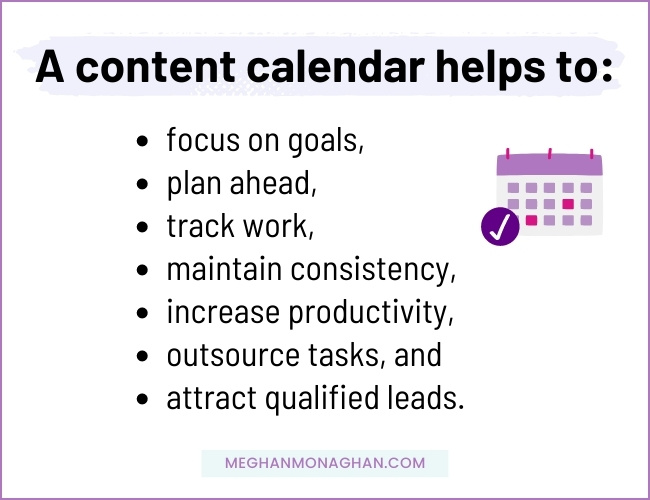
A content calendar ensures that you never miss a beat, allowing you to be more productive with your content creation and more effective with your marketing. Whether you’re a small business owner or part of a marketing team, this is how to implement your content strategy, generate more leads, and support your business goals.
Let’s explore why a content calendar is perfect for managing your content marketing and how to get started with your own calendar. Get ready to take your content creation game to the next level and experience the power of content planning!
What is a Content Calendar?
A content calendar is a tool or system used to plan, organize, manage, and track content creation (and sometimes distribution/promotion). It is a shareable, visual resource that outlines a publishing schedule for upcoming content based on a content strategy. It is sometimes called an editorial calendar.
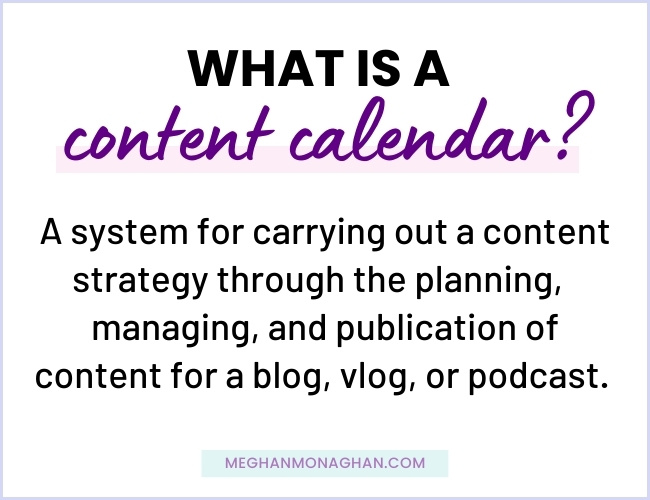
A content calendar is particularly useful for teams since multiple people can have visibility into the content planning process. It can prioritize resources and serve as a repository of who’s doing what and when as well as updating all team members on progress. (However, it also works just as well for solo marketers!)
Content calendars can take many forms. You can use a simple spreadsheet, a Microsoft Word or Google Doc, and apps like CoSchedule and Asana. Choose whatever format works for you!
Calendars help you to plan and publish content, such as blog posts, podcast episodes, videos, social posts, and even email campaigns. This helps to organize and manage content across various mediums, including websites, social networks, and email platforms.
NOTE: this article concentrates on content calendars for Authority Hubs—ie. blogs, vlogs, and podcasts.
A content calendar can have as little or as much information as you desire. It all depends on your needs and preferences. By having a well-organized and detailed calendar, you will stay on top of content production through a visual representation of what to write and publish to attract your target audience.
A content calendar helps you to plan and manage the content for a blog, vlog, or podcast, which makes it easier and less stressful to achieve business and marketing goals.
What is the Purpose of a Content Calendar?
A content calendar’s primary purpose is to manage content publishing from ideation to publication. This includes planning, organizing, scheduling, and tracking content to increase efficiency and consistency and to meet your content goals.
In other words, the calendar streamlines the content creation and management process making it easier to implement your content strategy. After all, a content strategy isn’t helpful if you don’t take action on it!
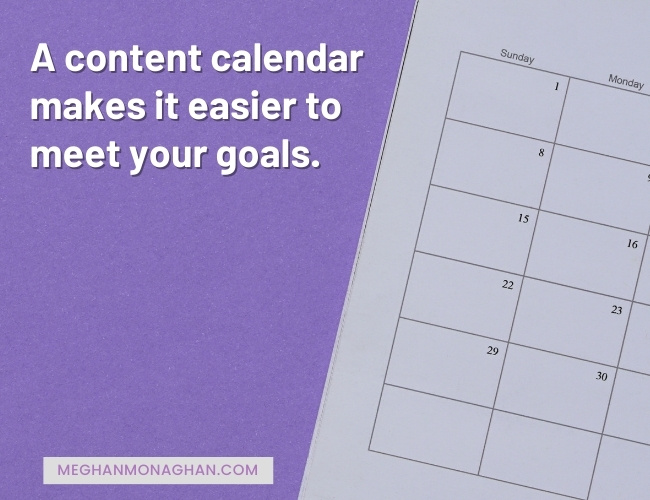
By the way, there are secondary purposes of a calendar that may not be obvious at first glance. Some examples are to:
- improve your marketing productivity,
- focus on content topics that attract qualified buyers,
- reduce stress in the content creation process,
- keep you on track with your workload,
- manage resources and collaborate with others,
- avoid duplicating efforts, and
- identify gaps in content as well as the content planning stage.
Why is a Content Calendar Important?
A content calendar puts your content strategy into action. It provides a clear roadmap to plan, organize, and track content creation based on your strategy.
Without a calendar, content production can become haphazard. You may find yourself dealing with the last-minute stress of creating content on the fly. This leads to arbitrary content topics in an effort to “publish something” rather than deliberate subjects that help to achieve business goals.
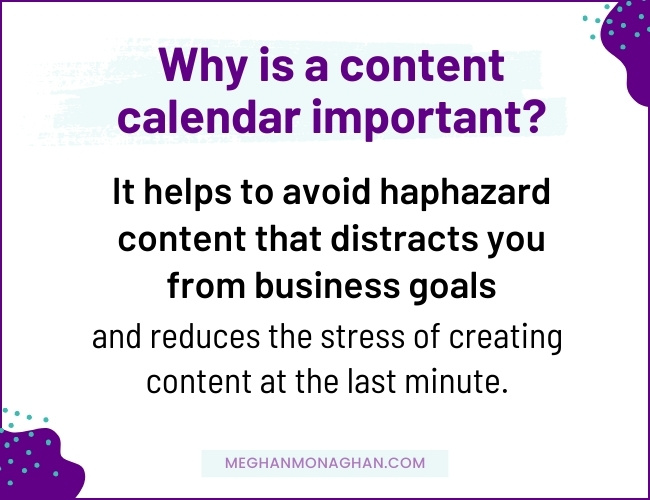
A calendar helps you to avoid those random acts of content and inconsistent content marketing, which happen when you don’t plan ahead.
With a clear plan in place, you can allocate time for research, writing, editing, and promoting your content. Also, you can strategically plan topics, assign tasks, set deadlines, and establish a publishing schedule. This will reduce your stress and ensure that your content is high quality as well as relevant to your target audience and your objectives.
Planning ahead and organization are the keys to consistency in content marketing!
Collaboration is another reason why a content calendar is important. The calendar supports teamwork to establish content goals and ensure everyone is on the same page. It can help each team member know their role and responsibilities. By collaborating, it’s much easier to identify potential issues and to address them before they become bigger problems.
If you don’t have a team yet, then having the calendar is still important for you to manage your content. And, when you’re ready to outsource or hire help, this valuable tool will make the transition much easier.
Whether you have a team or you’re managing content solo, staying on top of content management is a must! It’s better to anticipate and plan ahead, whether it’s to support a product launch or to publish an evergreen piece of content.
What are the Benefits of Having a Content Calendar?
A content calendar provides numerous advantages.
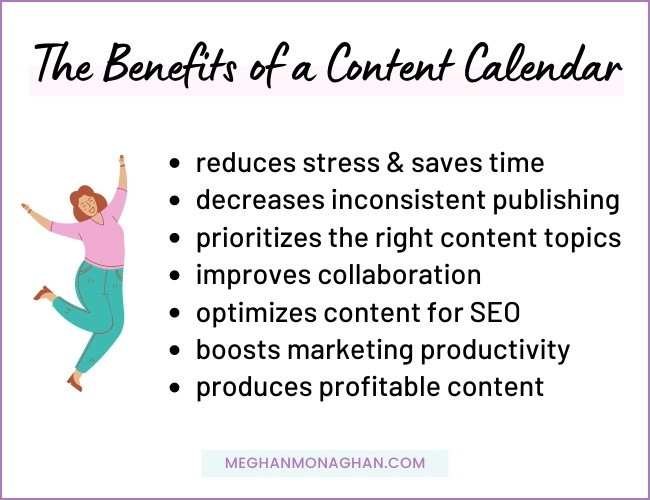
First, it can help make content creation less stressful and more manageable by facilitating planning and preparation. This saves time, reduces inconsistent publishing, and improves content quality.
Second, a calendar prioritizes content. With a clear roadmap, you will create content that aligns with your overall content strategy, including your business goals and target audience. That means attracting more qualified leads and supporting the business.
You’ll create content that pairs interested prospects with relevant products or services. And, that means more sales!
Third, a calendar improves collaboration among team members. By having a centralized location for content ideas and schedules, everyone is on the same page and can work together more effectively.
Finally, a content calendar aids search engine optimization (SEO). It makes it easier to stay focused on strategically planning content around keywords, relevant topics, and trends. Because—while it’s important to write for your target audience—you also need to optimize for search engine rankings. And, a calendar guides you to focus on both!
Overall, a content calendar is an essential tool for:
- marketing productivity
- creating profitable content and
- managing content marketing on a budget.
What Should a Content Calendar Include?
As with any productivity tool, it’s up to you to choose your preferences and meet your business needs. But, here are some of the elements of a calendar that you may want to include:
- publication dates or other milestones
- authors
- keywords / content topics
- titles / headlines
- URL
- content goals / business goals
- target audience and buyer intent or stage of awareness
- related business goal and/or lead magnet
- competition
- SEO metrics
- content category
- notes
In general, the idea is to use the calendar to identify suitable content topics and assign each piece of content to a publishing date, author, and keywords (to improve SEO).
You could stop there. These elements would form a bare bones version of a calendar. This is a decent starting place. There’s nothing wrong with starting small!

Depending on your content workflow and business, you may want to include the other elements to quicken the content creation process, keep team members informed, or direct writers in their content creation.
For example, doing more work upfront to determine a title or headline makes writing easier and removes any barriers to trying to come up with the theme during the creation phase.
Likewise, including content and business goals, target audience, and SEO metrics guides the writing, format, and direction of the content. What you include can keep intention front and center so that you don’t overlook what’s important to your avatar and to the business.
Anyway, what you include in your calendar depends on how you use the tool to manage your content. Whether it is for scheduling and publishing content or for guidance in the content creation and SEO process (or all of these things), you can make it what you want!
Use This Google Sheets Content Calendar Template to Get Started Quickly
By now, you’ve got a good idea of why you’d want to incorporate a content calendar into your marketing process. So, let me make it easy for you to start one for your blog, vlog, or podcast! I’m going to share my calendar template with you.
I use Google Sheets for my clients’ and my own content calendars since it is free and can be accessed from anywhere with an internet connection. The app is also intuitive if you’ve used spreadsheets in the past. Plus, it’s easy to collaborate with team members by sharing the document and making edits in real-time.
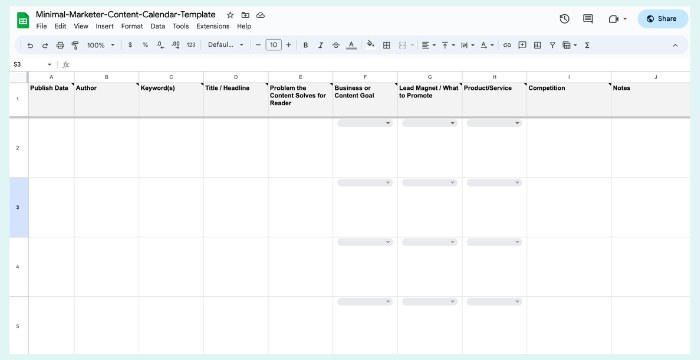
However, before you start your calendar, make sure you’ve formulated a content strategy. If you don’t have one yet, you can come up with one quickly using my framework for a simple, basic content strategy.
Why strategy first? Because you need to identify at least three elements before creating a calendar:
- target audience,
- business / content goals, and
- general content requirements.
You may also want to consider any significant industry events (ie. trade shows, conferences) or product launches that may impact your content planning.
Once you’ve got that sorted out, you can begin planning your content! Here are a few steps to get started.
Step 1: Download the content calendar template.
There are various templates available online, including an editorial calendar from Hubspot or spreadsheetpoint. However, for this example, I’ll be using my Google Sheets content calendar template.
Save a copy of my Minimal Marketer Content Calendar Template – no email required! ⤵️
Step 2: Fill out the template.
Use the content calendar template to create your own custom calendar by filling out each column for each piece of content.
Each column header has a note to guide you. Simply click the header to display the note.
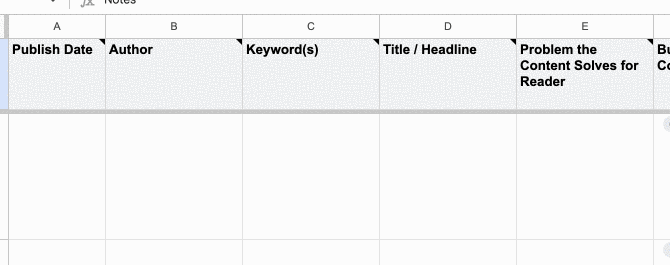
For the columns with values that you’ll re-use, there are dropdown options that you can customize.
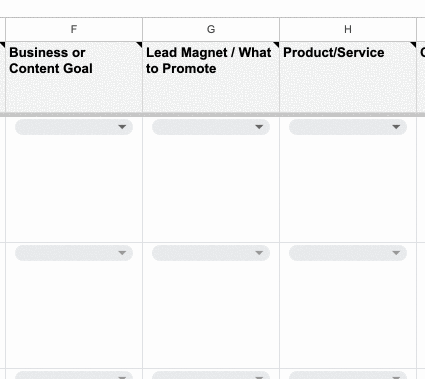
To customize, click in the column and select the “edit” pencil icon.
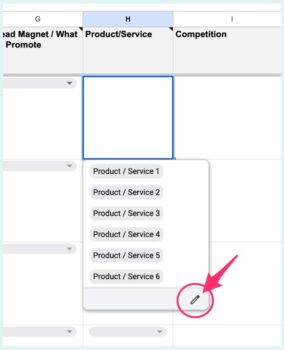
Then edit the labels in the pop-up Data Validation Rules window.
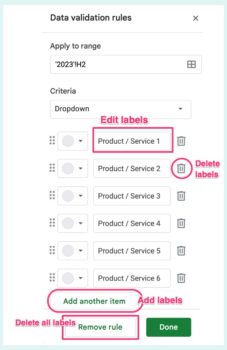
You can delete all of the labels by clicking “Remove rule” if you decide you don’t want to use the dropdown menus. But I encourage you to use “rules” to standardize the options in these columns. This helps to keep you focused on content strategy in these areas and to maintain consistency within the document.
This quick tutorial is meant to get your calendar set up quickly. But, if the document doesn’t meet your needs, feel free to use a different content calendar template or create your own Google Sheets document from scratch. Or, check out some of the other options like CoSchedule and ClickUp to help you manage your content.
Interested in more hands-on guidance to create your own custom content calendar for a blog, vlog, or podcast? Get on the waitlist to be notified when the training is ready (later this year). Everyone on the waitlist will receive a significant discount!
But, hopefully, this example has been enough to get you started!
Note: choosing your keywords and content topics for your calendar is beyond the scope of this article.
Best Practices for Maintaining a Content Calendar
You’ll always be making changes to your calendar! This isn’t a one-and-done exercise. That’s why it’s important to follow some best practices to get the most of your content calendar. Here are a few tips:
1) Regularly update your calendar.
Keep your content calendar updated so that it is accurate and effective as a management tool. You’ll get out of it what you put in (like everything in life!).
Add new columns or tabs if needed. Adjust due dates if necessary. Track work and results. Note new ideas. This ensures that everyone on your team is on the same page and in the know. If there’s a question, the calendar can be the document of record.
2) Communicate with your team.
Maintain open communication with your team members. Share your content calendar, gather feedback, and discuss ideas. This supports collaboration and ensures a cohesive content strategy.

3) Stay flexible.
While it’s important to have a plan, it’s also helpful to stay flexible. Don’t be afraid to adjust your content calendar if new opportunities or challenges arise.
Sometimes a trend or an unexpected campaign lands in your lap. Perhaps your company has shifted its target audience or started a new product line.
Change is inevitable! And, adaptability is key to staying relevant in marketing and in a rapidly changing landscape.
4) Plan for updating older content.
Unless you’re starting from scratch, you won’t always be creating new content. There will be times when you need to update, revise, and redo existing content. Look for opportunities to revamp and republish old content. And, be sure to include it on the calendar!
5) Assess frequently.
As your business and team grows, you may need to use new tools to stay on top of your content marketing. Every quarter or so, assess what’s working and what’s not.
Don’t hesitate to try new document formats or apps to help you manage the content on your blog, vlog, or podcast. If you branch out to multiple platforms and take on new projects, you may need a different way to plan your content.

Do You Need a Content Calendar for a Blog, Vlog, or Podcast?
I’ve given you plenty of reasons why a calendar is beneficial for content planning and management. Most of the time, you’ll need some way to keep up with content marketing. Otherwise, you’ll fall behind. This means less lead generation and potentially less business growth.
Although I believe that every content marketer needs a calendar, you may want to take a different approach. As long as you plan ahead and capture the information you need to manage things, then you should be able to keep up with the demands of content marketing. There are multiple factors to consider! Marketing isn’t a one-size-fits-all solution.
But, I do know that the content calendar is a terrific method to lessen the stress of figuring out what content to create and when. And, it keeps you focused on profitable content (aka marketing that supports the business goals). After all, I’ve seen first hand the joy in my clients’ faces and heard their relief when I deliver their custom content calendar!
When the calendar is created, some of the prep work is done ahead of time, and that removes the pressure of last-minute content. Who regrets planning ahead and being prepared when it comes to content marketing? No one!
Interested in more hands-on guidance to create your own custom content calendar for a blog, vlog, or podcast? Get on the waitlist to be notified when the training is ready (later this year). Everyone on the waitlist will receive a significant discount!

I mean seriously, this is a no brainer… we need a calendar to manage our time, to be more efficient and to be reminded of our tasks, our to dos and etc. Why wouldn't we implement this as part of that regular routine?!!? As small business owners, we need to work smarter and not harder so all these tips, points and just the principal of having this together, is gold. Thank you Meghan for sharing your brilliance with the world!
You are one of the most organized, productive people I know, Kristen! As a marketing consultant, you also understand how valuable planning ahead is, especially when it comes to achieving goals and getting the most from marketing. It’s one of the reasons that you’re so successful in your own businesses! Thank you for commenting and sharing!